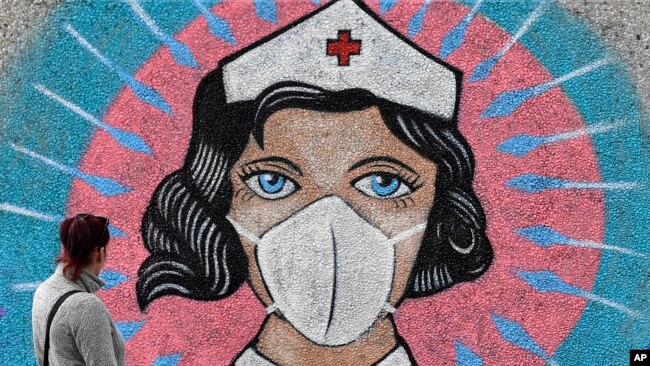This week, Germany launched a coronavirus tracing system that officials say is so secure even government ministers can use it. The system is designed to warn smartphone users who might have been in contact with an infected person.
Germany is the latest European nation to develop its own smartphone app to target coronavirus infections. Experts describe the app as an important tool in the fight against COVID-19, the disease caused by the coronavirus.
But developers of the system have had to overcome legal and cultural issues. The European Union has enacted legislation for technology companies and websites that collect personal information. This week, Norway suspended its contact tracing app after data protection officials raised concerns about user privacy.
In Germany, a person’s right to their own data – even after death - is guaranteed by the constitution. Many Germans were quick to criticize early government calls to use information from mobile phone transmitting stations to identify users’ locations.

A woman looks at a coronavirus graffiti by street artist 'Uzey' showing a nurse with a face mask on a wall during a walk in Hamm, Germany, on Easter Monday, April 13, 2020. (AP Photo/Martin Meissner)
Tracing a person’s location in real-time is also sensitive in a country with a history of dictatorships. Both the Nazi Party and East Germany’s communist government collected huge amounts of personal information that could later be used against citizens.
“That’s why we have always been very sensitive in Germany when it comes to the state collecting information on its citizens,” noted Frederick Richter. He is the director of Germany’s Foundation for Data Protection. He spoke with The Associated Press (AP).
The new app – which is based on a model created by Apple and Google - was developed by Germany’s SAP and Deutsche Telekom. Use of the app is voluntary. It does not use location data to follow people’s movements. Instead, the system uses Bluetooth wireless technology to permit devices near each other to exchange information.
The app creates a record of which other smartphones are within two meters for at least 15 minutes. If users become infected with COVID-19, they can inform other app holders who were nearby at the time that they may have been infected.
German officials say the “Corona-Warn-App” was developed with strong privacy protections. For example, data collected is stored only on individual phones, not on centralized servers. The Bluetooth exchanges are encrypted to protect user identity.

A man with a mask to protect from the coronavirus takes pictures under blooming cherry trees in Bonn, Germany, Sunday, April 5, 2020. (AP Photo/Martin Meissner)
Developers said tests of the app showed it was able to correctly identify about 80 percent of people’s contacts.
Germany’s health minister, Jens Spahn, called the app “an important tool” to help contain the spread of COVID-19. But he warned that it should not be a replacement for other anti-virus measures. These include social distancing, wearing face coverings and other methods of contact tracing.
Spahn said the app would likely lead to an increase in people seeking to get tested. But he told the AP, “I’d rather test too many than test too few.”
Some politicians have called for a law to make sure private businesses do not try to pressure the public or employees into using the app. The German government noted that “voluntary means voluntary,” and said the app will keep being improved.
Chancellor Angela Merkel’s government has generally been praised for its actions to deal with the COVID-19 health crisis. The country’s death rate was about one-fifth of Britain’s and one-fourth of Italy’s.
In a recent opinion study, 42 percent of Germans said they planned to use the contact tracing app. Thirty-nine percent said they would not. The rest said either they did not have a smartphone or were undecided.

Norway's Minister of Health, Bent Hoie Abid Raja gets his hair cut by hair dresser Morten Johansen, as hair dressers reopened after being closed down for more than six weeks in an effort to avoid spreading fo the COVID-19 Coronavirus, in Oslo, Norway.
Other European countries – led by Switzerland, Italy, Poland, and Latvia – have created contact tracing apps based on Bluetooth technology. France recently launched a tracing app that collects data on centralized government computers. The choice to use a non-Bluetooth system led to criticism from privacy activists.
Norway’s decision to suspend its contact tracing app came after the country’s data protection watchdog objected to the app’s collection of location data. The group said the country’s dropping infection rate meant the data gathered by the app could no longer be justified against privacy concerns.
Top Norwegian health officials said the suspension “weakened the country’s preparedness” in case the infection rate starts to increase again. The officials said they planned to meet with data protection officials to push for the app to be turned back on.
Words in This Story
trace – v. to find the origin of something
app – n. a program for a smartphone or other device that performs a special function
data - n. information or facts about something
transmitting – adj. used for sending out signals for radio, television, or mobile phones
location – n. a place or position
encrypt – v. to change electronic information into a secret system of letters, numbers of symbols
watchdog – n. an organization whose job is to make sure that companies and governments behave legally and provide good services